Cottage cheese is good for you because it’s rich in high-quality protein, calcium, and essential nutrients that support muscle growth, bone strength, and overall wellness.
As a versatile, low-calorie dairy food, cottage cheese fits easily into balanced diets—from weight management to high-protein fitness routines. Understanding its health benefits can help you make smarter choices for daily nutrition. When selecting cottage cheese, opt for low-fat, low-sodium, and pasteurized versions for the best health outcomes, as recommended by the U.S. Department of Agriculture (USDA) and American Heart Association (AHA).
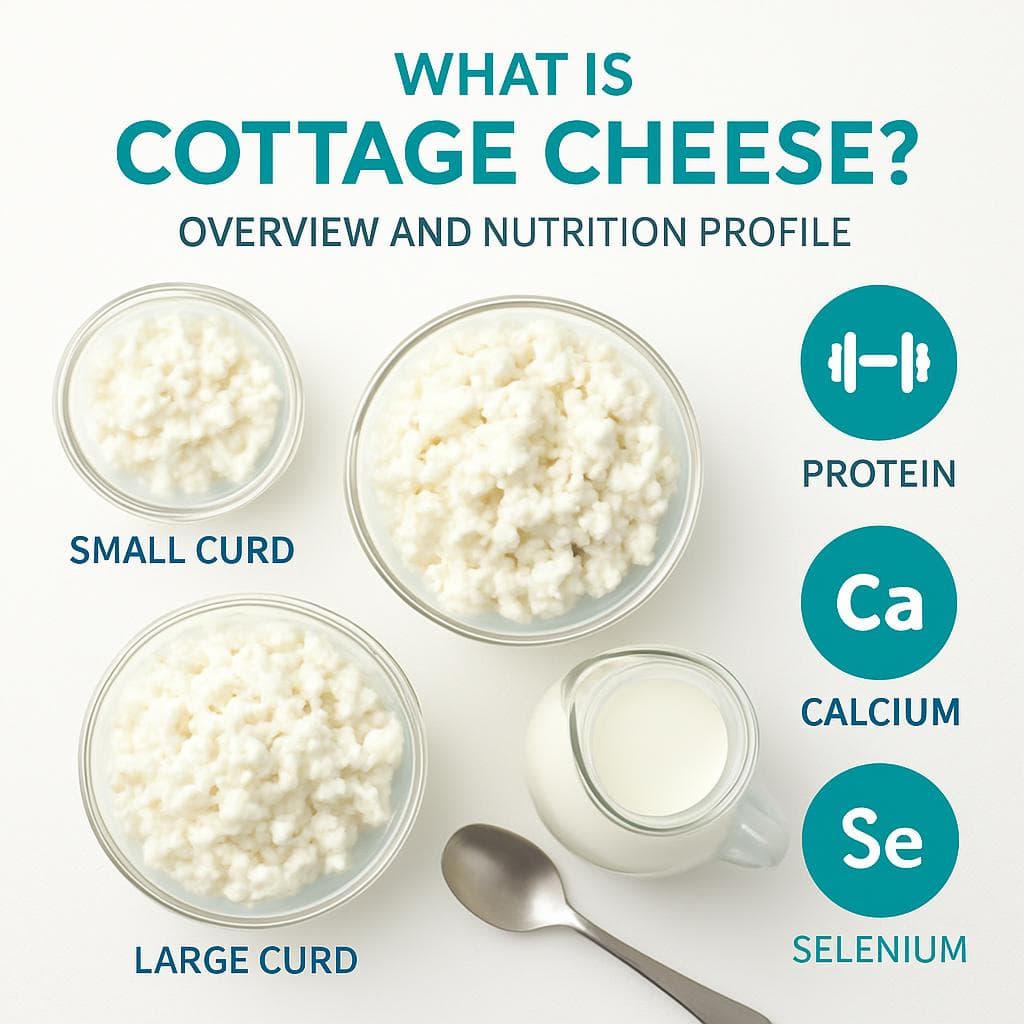
What Is Cottage Cheese? (Overview and Nutrition Profile)
Cottage cheese is a fresh, unripened cheese made by curdling milk with an acid or enzyme, then draining off the liquid whey while keeping some moisture in the curds. Unlike aged cheeses, it is mild in flavor, soft in texture, and rich in high-quality protein, primarily casein — a slow-digesting milk protein that supports satiety and muscle maintenance.
Cottage cheese can be made from whole, low-fat, or nonfat milk, offering options to fit a variety of nutrition goals. It’s widely recommended by dietitians as a high-protein, low-calorie food suitable for both weight management and muscle recovery plans.
According to the U.S. Department of Agriculture (USDA) FoodData Central (2024), low-fat (2%) cottage cheese provides the following nutrients per 100 grams:
| Nutrient | Amount (per 100 g) | % Daily Value (approx.) |
|---|---|---|
| Calories | 90 kcal | — |
| Protein | 13 g | 26% |
| Total Fat | 2 g | 3% |
| Saturated Fat | 1.3 g | 6% |
| Carbohydrates | 3–4 g | 1% |
| Sugars (lactose) | 3 g | — |
| Sodium | 400 mg | 17% |
| Calcium | 70–100 mg | 7% |
| Phosphorus | 190 mg | 15% |
| Selenium | 10–20 mcg | 18–36% |
| Vitamin B12 | 0.4 µg | 17% |
(Source: USDA FoodData Central – Cottage Cheese, Low-Fat 2%)
Cottage cheese is also a valuable source of B vitamins (especially riboflavin and B12), phosphorus, and selenium, all of which support metabolism, bone health, and immune function.
From a dietary standpoint, the USDA MyPlate guidelines classify cottage cheese as part of the Dairy Group, noting that 2 cups of cottage cheese are equivalent to 1 cup of dairy.
Key takeaway: Cottage cheese is a nutrient-dense, high-protein dairy food that supports energy metabolism, muscle recovery, and bone health when consumed as part of a balanced diet.
10 Proven Health Benefits of Cottage Cheese (Backed by Science)
Cottage cheese is more than a creamy dairy snack—it’s a nutrient-dense, high-protein food that supports muscle, bone, and metabolic health. Backed by current nutrition research, here are ten science-supported ways this simple food can benefit your overall wellness when consumed as part of a balanced diet.
1. Supports Muscle Growth and Recovery
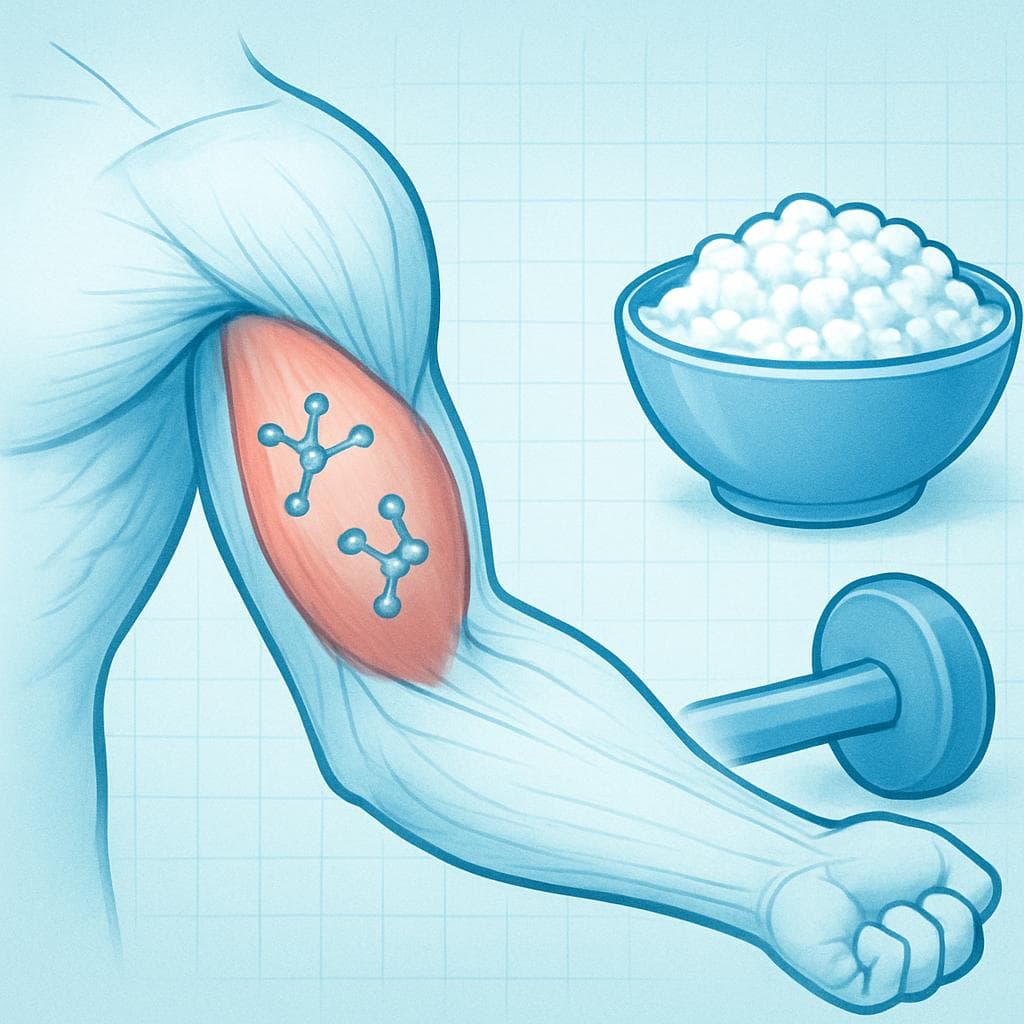
Cottage cheese is a rich source of casein protein, a slow-digesting milk protein that provides a steady release of amino acids to muscles over several hours. This makes it an ideal food choice for promoting muscle maintenance and overnight recovery, especially when eaten before bed or between meals.
According to a peer-reviewed study published in Frontiers in Nutrition (available via PubMed, 2020), consuming 20–40 grams of casein approximately 30 minutes before sleep can support overnight muscle protein synthesis and improve whole-body protein balance during recovery from exercise. Researchers found that casein ingestion before sleep enhanced muscle repair and growth in both trained and recreational athletes without affecting sleep quality.
2. Promotes Satiety and Healthy Weight Management
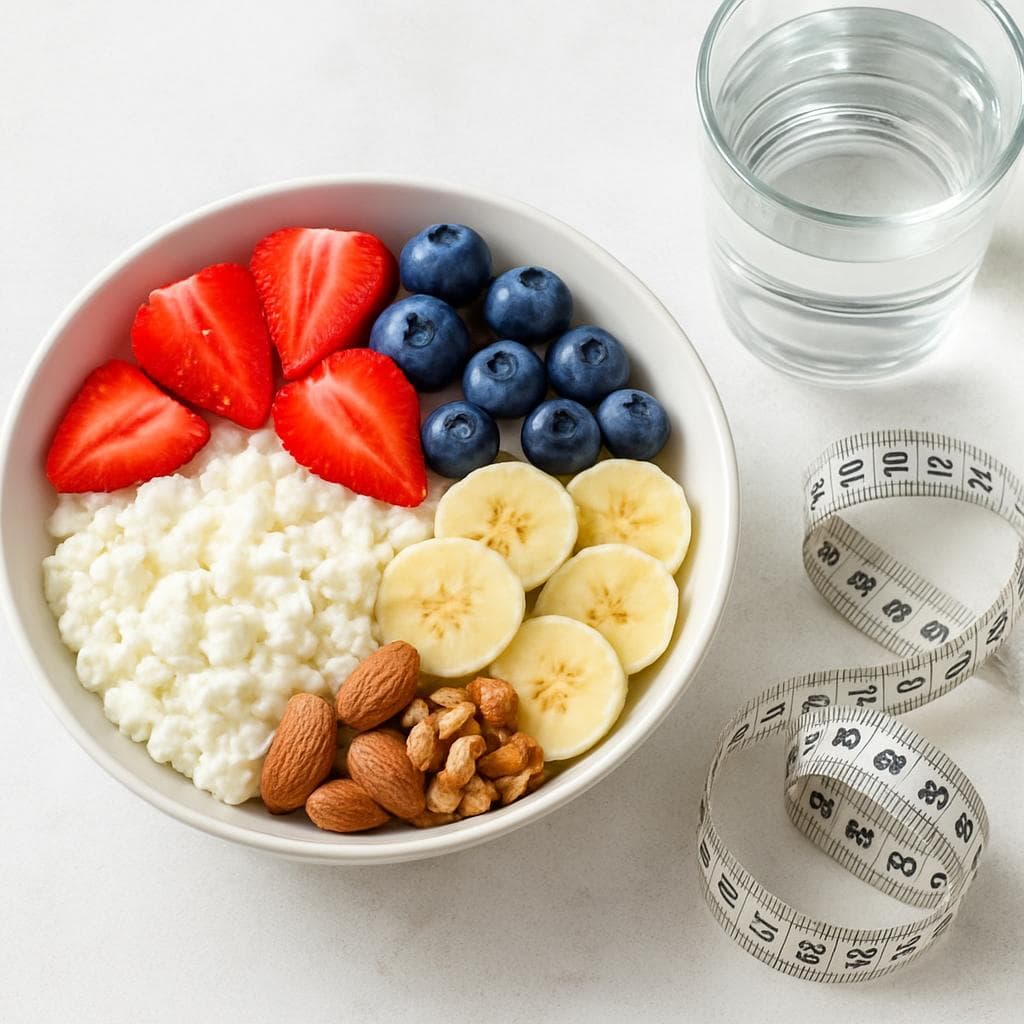
High-protein foods such as cottage cheese may help you feel fuller for longer, reducing unnecessary snacking and supporting weight management goals.
According to a 2024 study in the American Journal of Clinical Nutrition, dietary protein stimulates satiety hormones and helps regulate appetite, leading to reduced calorie intake throughout the day (AJCN, 2024).
With roughly 90 calories and 12–13 grams of protein per ½ cup serving, cottage cheese makes an excellent low-calorie, nutrient-dense snack.
Tip: Replace processed snacks with low-fat cottage cheese mixed with fresh berries or cucumber slices for a balanced and satisfying option.
3. Supports Bone Health
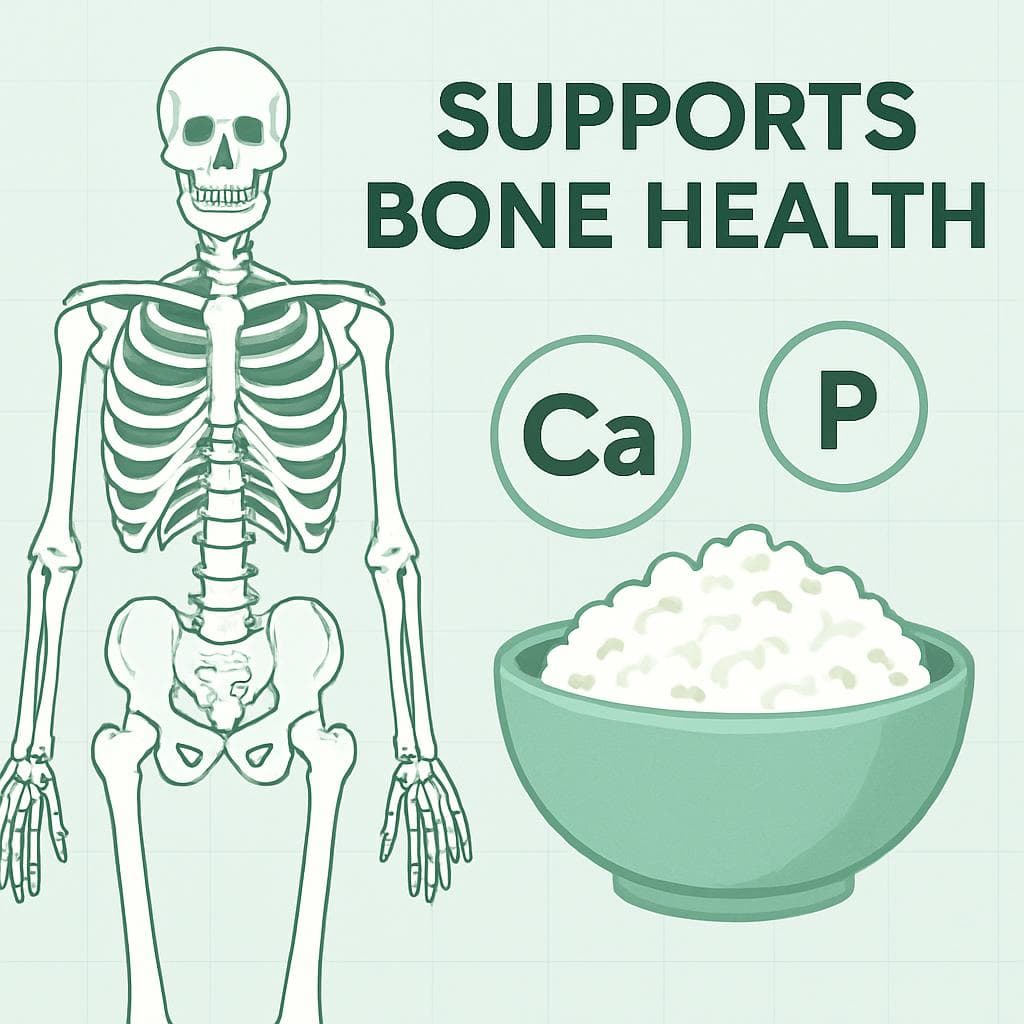
Cottage cheese provides a combination of calcium, phosphorus, and protein, three essential nutrients for maintaining strong bones and preventing age-related bone loss.
According to the U.S. Dietary Guidelines for Americans (2020–2025), regular dairy intake contributes to bone mineral density and lowers the risk of osteoporosis when combined with a nutrient-rich diet (U.S. Department of Agriculture, 2024).
Even small servings of cottage cheese contribute meaningfully to daily calcium needs—especially for those who don’t consume large amounts of milk or yogurt.
4. May Support Heart Health (When Low-Fat and Low-Sodium)
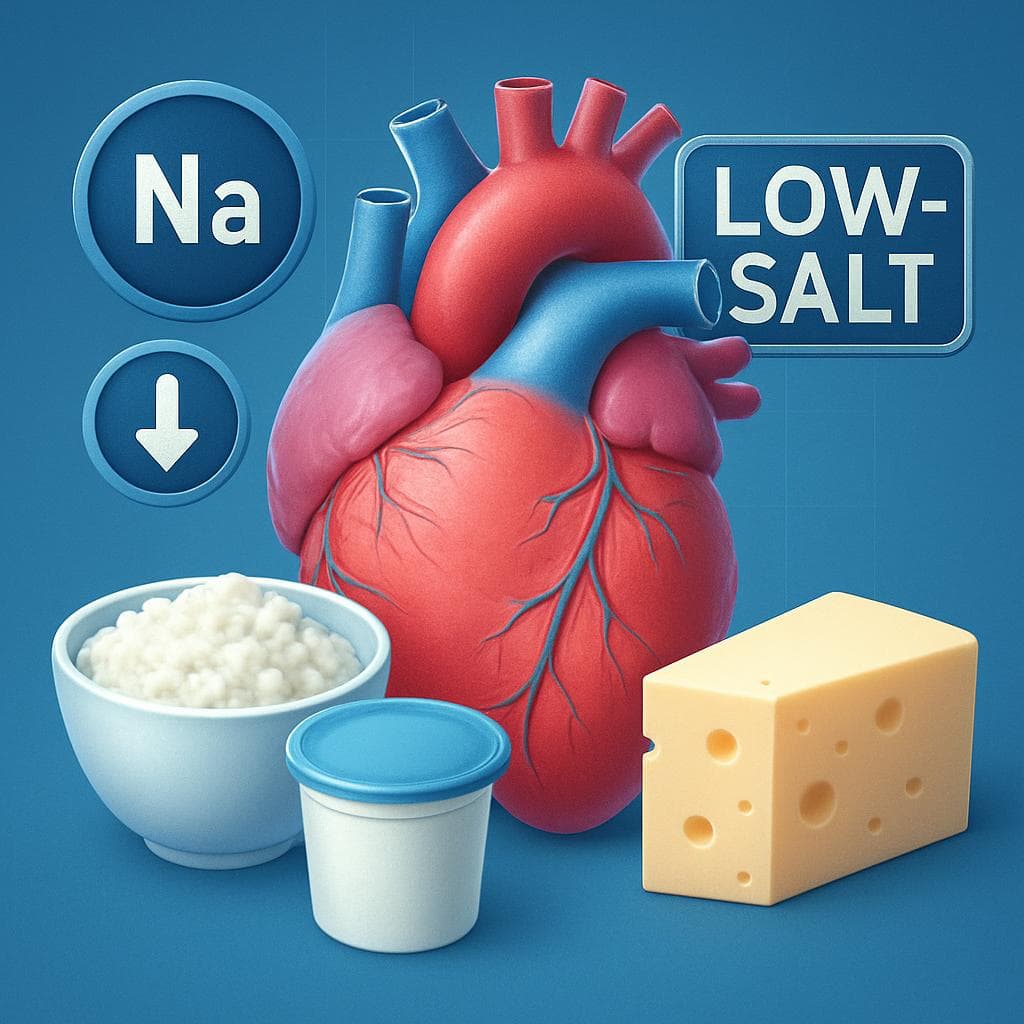
Choosing low-fat and reduced-sodium cottage cheese supports cardiovascular wellness.
The DASH (Dietary Approaches to Stop Hypertension) plan, developed by the National Heart, Lung, and Blood Institute (NHLBI), encourages low-fat dairy foods for their protein and mineral benefits while controlling saturated fat intake (NHLBI, 2024).
However, standard cottage cheese may contain 400–450 mg sodium per ½ cup, so opting for “low-sodium” or “no salt added” versions aligns better with American Heart Association (AHA) guidelines recommending less than 2,300 mg sodium per day (AHA, 2024).
5. Helps Maintain Blood Sugar Stability
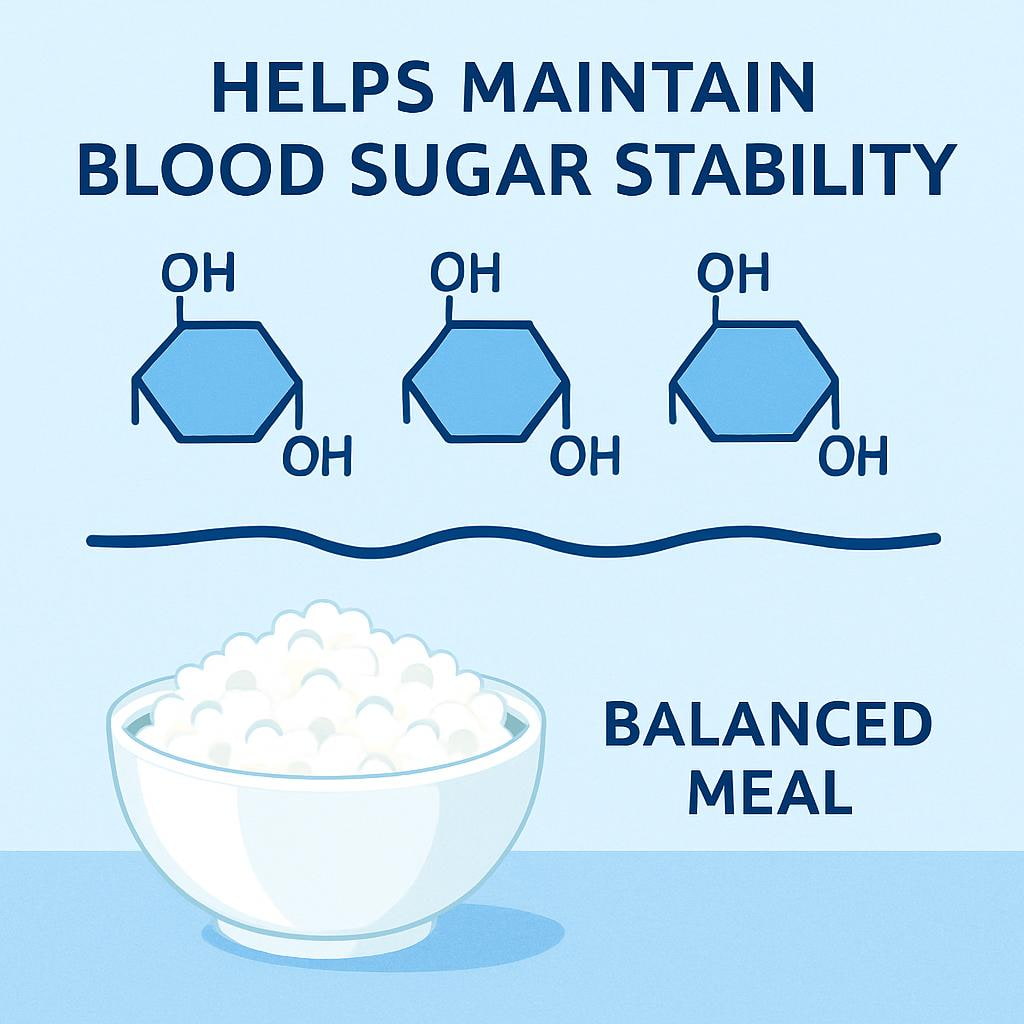
Cottage cheese’s high protein and low carbohydrate profile may help stabilize blood sugar levels by slowing glucose absorption.
A systematic review published in Nutrients (2023) reported that high-protein foods may help support balanced post-meal blood sugar responses, making cottage cheese a suitable option for those watching carbohydrate intake (Nutrients, 2023).
Pairing cottage cheese with high-fiber foods like whole grains or vegetables further enhances this effect.
6. May Support Gut Health (If Containing Live Cultures)

Certain brands of cottage cheese are made with live and active probiotic cultures, similar to those found in yogurt. These beneficial bacteria may help support digestive balance, nutrient absorption, and immune health when included as part of a balanced diet.
According to UCLA Health (2024), cottage cheese products labeled with “live and active cultures” contain beneficial bacteria that can promote a healthier gut microbiome. However, not all cottage cheeses are made this way—many commercial varieties are pasteurized after fermentation, which eliminates probiotic activity.
To gain potential gut health benefits, choose brands that clearly state “contains live and active cultures” or “with probiotics” on their packaging. These varieties may support a diverse gut flora and digestive wellness while also contributing valuable protein and calcium.
7. Provides an Excellent Source of B Vitamins
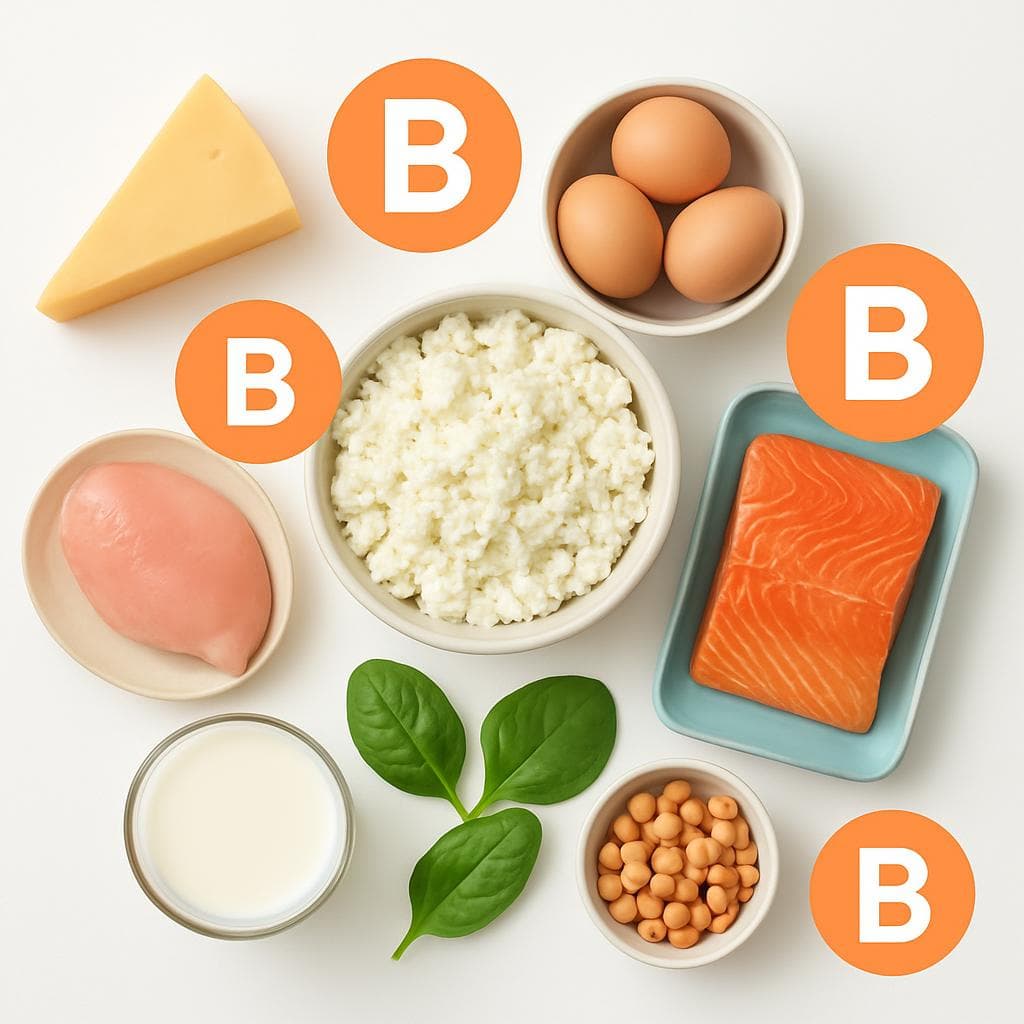
Cottage cheese naturally contains vitamin B12, riboflavin (B2), and niacin (B3)—essential nutrients that help convert food into energy and support the nervous system.
According to the National Institutes of Health (NIH), vitamin B12 is necessary for healthy nerve function and red blood cell production, particularly important for vegetarians or those limiting meat intake (NIH Office of Dietary Supplements, 2024).
A ½ cup serving can provide up to 20% of the daily value for vitamin B12 depending on the brand.
8. May Help Preserve Lean Muscle During Weight Loss

Including cottage cheese in a calorie-controlled diet may support muscle preservation while promoting fat loss.
A 2023 Journal of the International Society of Sports Nutrition study found that adequate protein intake during calorie restriction helps maintain lean body mass and metabolism (JISSN, 2023).
Because it is both high in protein and low in calories, cottage cheese is ideal for individuals following structured weight loss or fitness programs.
9. Can Be a Good Source of Selenium and Phosphorus
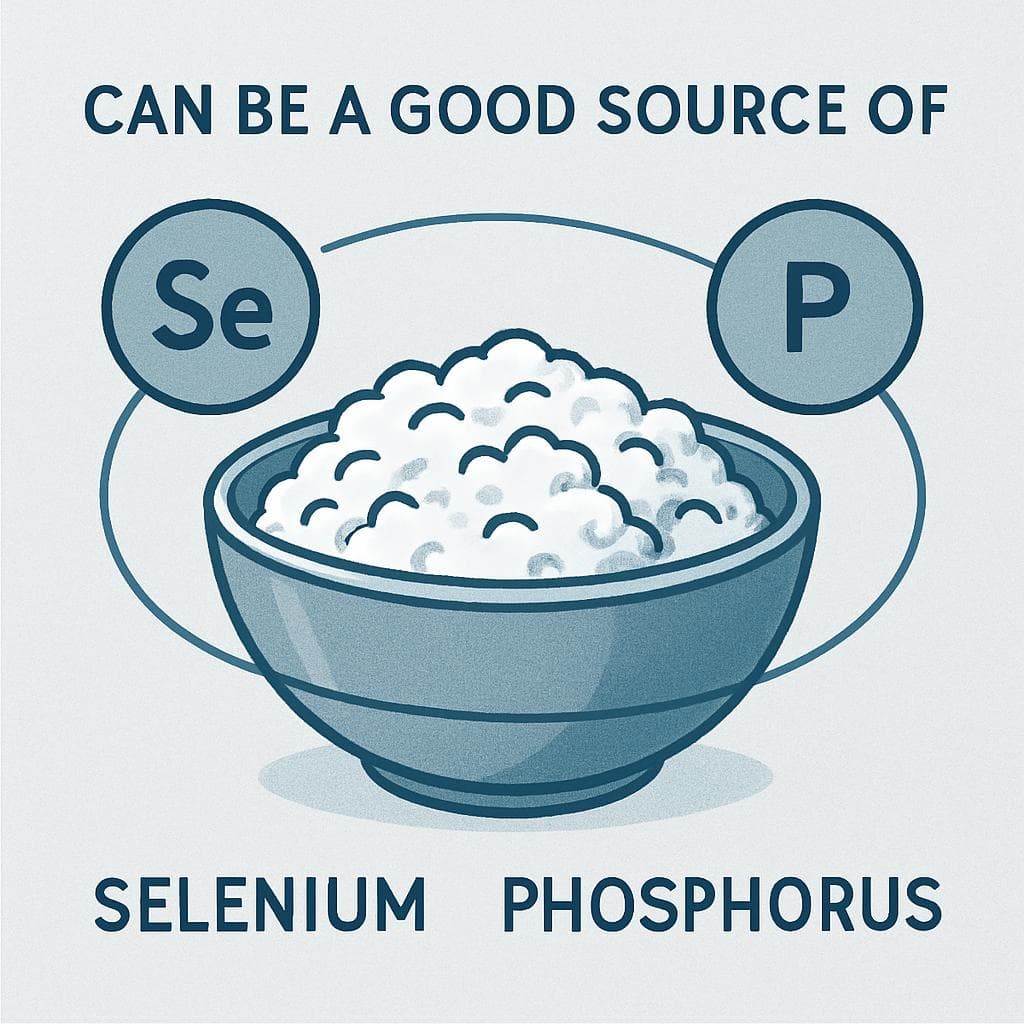
Cottage cheese contains selenium, an antioxidant mineral that helps protect cells from oxidative stress, and phosphorus, vital for bone strength and energy metabolism.
According to the USDA FoodData Central (2024), ½ cup of low-fat cottage cheese provides approximately 10–20 micrograms of selenium, or nearly one-third of the daily value for adults (USDA, 2024).
Including it regularly in meals may support immune health and help meet essential mineral needs.
10. Supports a Balanced Diet for Active Lifestyles

Because it’s portable, protein-rich, and easy to digest, cottage cheese fits perfectly into active, on-the-go routines.
It can be enjoyed post-workout to replenish amino acids or as a balanced breakfast component paired with fruit, nuts, or whole-grain toast.
The Harvard T.H. Chan School of Public Health notes that moderate dairy intake, especially low-fat varieties, can provide valuable nutrients without excessive saturated fat, contributing to overall wellness (Harvard Nutrition Source, 2024).
Possible Side Effects and Precautions
Cottage cheese is considered safe and nutritious for most people when consumed in moderation, but certain components—such as sodium, lactose, and fat content—should be monitored depending on individual dietary needs or health conditions.
1. Sodium Content
Many commercial brands of cottage cheese are moderate to high in sodium, with about 400–450 mg per ½ cup (113 g) serving. Consuming excess sodium may increase the risk of high blood pressure and heart disease.
The American Heart Association (AHA) recommends limiting daily sodium intake to no more than 2,300 mg, and ideally around 1,500 mg per day for optimal cardiovascular health.
Tip: Choose low-sodium or no-salt-added varieties when available.
2. Lactose Sensitivity
Cottage cheese naturally contains lactose, a milk sugar that some individuals may find difficult to digest. Symptoms of intolerance may include bloating or stomach discomfort.
For those who are sensitive, lactose-free cottage cheese is widely available and provides the same nutrients without digestive discomfort.
3. Fat Content
Full-fat cottage cheese contains more saturated fat, which may affect heart health if consumed in large amounts. Low-fat or 2% versions provide a healthier balance while retaining protein and calcium benefits.
The Dietary Guidelines for Americans (2020–2025) advise choosing low-fat or fat-free dairy to reduce saturated fat intake.
4. Pasteurization and Food Safety
Always choose cottage cheese made from pasteurized milk to ensure food safety and reduce the risk of foodborne illness. Pasteurization is the process of heating milk to destroy harmful bacteria, including Listeria monocytogenes — a pathogen that can cause listeriosis, a serious infection particularly dangerous for pregnant women, older adults, and people with weakened immune systems.
According to the Centers for Disease Control and Prevention (CDC), soft cheeses made from unpasteurized (raw) milk or those that become contaminated after production can carry Listeria bacteria, even if stored under refrigeration. The CDC advises consumers to avoid unpasteurized soft cheeses and always check the label for the word “pasteurized.”
How to Incorporate Cottage Cheese into Your Diet
Cottage cheese is versatile, easy to prepare, and pairs well with both sweet and savory dishes. Here are some practical, health-focused ways to enjoy it daily:
- Breakfast Bowl: Combine cottage cheese with berries, chia seeds, and a drizzle of honey for a protein-packed morning meal.
- Savory Snack: Spread cottage cheese on whole-grain toast and top with avocado slices and black pepper.
- Smoothie Booster: Blend ½ cup of cottage cheese with bananas, spinach, and almond milk for a creamy, high-protein smoothie.
- Post-Workout Recovery: Pair cottage cheese with pineapple or peach slices for a quick protein-carb balance after exercise.
- Salad Add-In: Use cottage cheese as a topping for green salads or grain bowls instead of dressing for extra creaminess and nutrition.
- Healthy Dip or Spread: Mix with herbs and garlic for a protein-rich vegetable dip or sandwich spread.
Frequently Asked Questions (FAQ)
1. Is cottage cheese good for weight loss?
Yes. It’s high in protein and low in calories, which may help promote fullness and support lean muscle during weight management.
2. Does cottage cheese contain probiotics?
Some brands do. Look for labels that mention “live and active cultures” or “contains probiotics.” Not all varieties include them.
3. Can lactose-intolerant people eat cottage cheese?
Possibly. Some people tolerate small amounts, while others may prefer lactose-free cottage cheese for comfort.
4. Is it safe to eat cottage cheese during pregnancy?
Yes, as long as it’s made from pasteurized milk. Avoid raw or unpasteurized versions to prevent infection risks such as Listeria.
5. Is cottage cheese suitable for people with high blood pressure?
Yes—if you choose low-sodium or no-salt-added versions, in line with AHA sodium guidelines.
6. How long does cottage cheese last once opened?
Generally 5–7 days in the refrigerator. Always keep it sealed and discard it if there’s any off smell or mold growth.
7. Is cottage cheese a good source of calcium?
Yes. One 100 g serving provides around 70–100 mg of calcium, supporting bone and muscle function.
Conclusion
Cottage cheese is a nutrient-dense, high-protein dairy food that may support muscle recovery, bone health, and weight management when enjoyed in moderation. For maximum benefit, choose low-fat, low-sodium, and pasteurized options, and check for live cultures if you want added probiotic value.
With its versatility, cottage cheese fits effortlessly into breakfast, snacks, or post-workout meals—helping you meet your daily protein and nutrient goals while supporting overall wellness.
This content is for informational purposes only and not medical advice.
References
- Centers for Disease Control and Prevention (CDC) – Listeria and Dairy Products
https://www.cdc.gov/listeria/causes/dairy.html - American Heart Association (AHA) – Sodium and Your Health
https://www.heart.org/en/healthy-living/healthy-eating/eat-smart/sodium - National Heart, Lung, and Blood Institute (NHLBI) – DASH Eating Plan
https://www.nhlbi.nih.gov/health-topics/dash-eating-plan - PubMed (National Library of Medicine) – Pre-Sleep Casein Protein and Overnight Muscle Protein Synthesis
https://pubmed.ncbi.nlm.nih.gov/32811763/ - UCLA Health – Cottage Cheese and Probiotics: What’s the Difference?
https://www.uclahealth.org/news/article/5-cottage-cheese-benefits-and-how-add-more-your-diet
